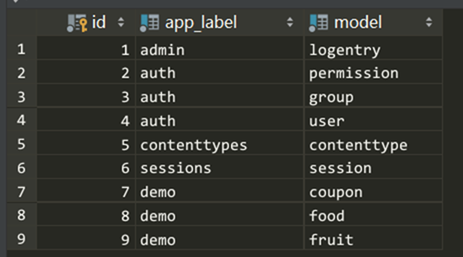
一般商城里有很多的商品,计优惠券对应着活动类型商品,家电是一类商品,食物是一类商品,优惠券对应着不同的商品类别。 from django.db import models class Appliance(models.Model): """ 家用电器表 id name 冰箱 电视 洗衣机 """ name = models.CharField(max_length=64) class Food(models.Model): """ 食物表 id name 面包 牛奶 """ name = models.CharField(max_length=32) class Fruit(models.Model): """ 水果表 id name 苹果 香蕉 """ name = models.CharField(max_length=32) class Coupon(models.Model): """ 优惠券表 id name appliance_id food_id fruit_id 通用优惠券 null null null 冰箱折扣券 1 null null 电视折扣券 2 null null 苹果满减卷 null null 1 我每增加一张表就要多增加一个字段 """ name = models.CharField(max_length=32) appliance = models.ForeignKey(to="Appliance", null=True, blank=True) food = models.ForeignKey(to="Food", null=True, blank=True) fruit = models.ForeignKey(to="Fruit", null=True, blank=True)<br># 实际上我们商品的种类会特别的多,导致我们这张表外键越来越多 遇到这种一张表要跟多张表进行外键关联的时候~我们Django提供了ContentType组件~ 需求
ContentType组件
ContentType是Django的内置的一个应用,可以追踪项目中所有的APP和model的对应关系,并记录在ContentType表中。
当我们的项目做数据迁移后,会有很多django自带的表,其中就有django_content_type表
ContentType组件应用:
-- 在model中定义ForeignKey字段,并关联到ContentType表,通常这个字段命名为content-type
-- 在model中定义PositiveIntergerField字段, 用来存储关联表中的主键,通常我们用object_id
-- 在model中定义GenericForeignKey字段,传入上面两个字段的名字
-- 方便反向查询可以定义GenericRelation字段
基于ContentType创建表结构

from django.db import models from django.contrib.contenttypes.models import ContentType from django.contrib.contenttypes.fields import GenericForeignKey, GenericRelation # Create your models here. class Food(models.Model): """ id title 1 面包 2 牛奶 """ title = models.CharField(max_length=32) # 不会生成字段 只用于反向查询 coupons = GenericRelation(to="Coupon") class Fruit(models.Model): """ id title 1 苹果 2 香蕉 """ title = models.CharField(max_length=32) # 如果有40张表 # class Coupon(models.Model): # """ # id title food_id fruit_id # 1 面包九五折 1 null # 2 香蕉满10元减5元 null 2 # """ # title = models.CharField(max_length=32) # food = models.ForeignKey(to="Food") # fruit = models.ForeignKey(to="Fruit") # class Coupon(models.Model): # """ # id title table_id object_id # 1 面包九五折 1 1 # 2 香蕉满10元减5元 2 2 # """ # title = models.CharField(max_length=32) # table = models.ForeignKey(to="Table") # object_id = models.IntegerField() # # # class Table(models.Model): # """ # id app_name table_name # 1 demo food # 2 demo fruit # """ # app_name = models.CharField(max_length=32) # table_name = models.CharField(max_length=32)
class Coupon(models.Model):
title = models.CharField(max_length=32) # 优惠券的名称
# 第一步
content_type = models.ForeignKey(to=ContentType, on_delete=None) # 商品表
# 第二步
object_id = models.IntegerField() # 商品对象的id
# 第三步 不会生成字段
content_object = GenericForeignKey("content_type", "object_id")
# # 绑定外键关系,防止商品id不在商品表里面
这样无论有多少张优惠券,都只需要外键关联Content_type一张表(里面存着所有表的关系),然后指明对象的id,就能找到优惠券对应的商品
当一张表跟多张表有外键关系时,都可以通过 ContentType 组件来建立
ContentType 查询
demo/views.py
from rest_framework.views import APIView from rest_framework.response import Response from .models import Food, Coupon from django.contrib.contenttypes.models import ContentType class DemoView(APIView): def get(self, request): # 给面包创建一个优惠券 food_obj = Food.objects.filter(id=1).first() # Coupon.objects.create(title="面包九五折", content_type_id=8, object_id=1) # 比较麻烦,需要找表id # Coupon.objects.create(title="双十一面包九折促销", content_object=food_obj) # 查询面包都有哪些优惠券 coupons = food_obj.coupons.all() print(coupons) # 优惠券查对象 coupon_obj = Coupon.objects.filter(id=1).first() content_obj = coupon_obj.content_object print(coupon_obj.title) """ <QuerySet [<Coupon: Coupon object (1)>, <Coupon: Coupon object (2)>, <Coupon: Coupon object (3)>, <Coupon: Coupon object (4)>]> 面包九五折 """ # 通过ContentType表找表模型 content = ContentType.objects.filter(app_label="demo", model="food").first() print(content) model_class = content.model_class() ret = model_class.objects.all() print(ret) """food <QuerySet [<Food: Food object (1)>, <Food: Food object (2)>]> return Response("ContentType测试") """

